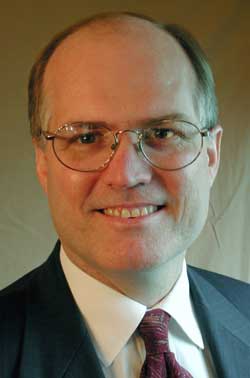He’s gotten virtually no national media attention, but there is a progressive candidate other than Ralph Nader running for president. His name is David Cobb, and he is hoping to show that the Green Party is more than a once-convenient vehicle for Nader.
Cobb, a lawyer and Green Party activist from Houston, accepted the party’s presidential nomination in June after Nader spurned the party for an independent bid. He is the first Green presidential candidate to rise through the ranks of the party, having co-founded the Texas Green Party and run for attorney general there in 2002. That’s an advantage, to hear Cobb tell it—showing the strength and vibrancy of the Greens’ grass roots—but it also means that, unlike Nader in 1996 and 2000, he is largely unknown across the country.
Not surprisingly, Cobb is unhappy with his relative anonymity. “The corporate elite control the media, so that’s a built-in bias against progressive politics,” he noted during a campaign stop in Seattle recently. That bias, Cobb says, would exist even if he were a factor in the polls. It results in exclusion of “minor” candidates from the debates, dismissive media coverage, and difficult ballot access laws. He will be on the ballot in 30 states next month. “The story the media is missing,” he says, “is that the Green Party is not just surviving, but growing, in a system that’s stacked against its success.”
Perhaps wisely, Cobb refuses to set specific goals for numbers of votes he hopes to receive next month. This time around, there are no brave words of pulling 5 percent of the electorate. Instead, he ticks off a variety of goals for his campaign: “To register more people in the Green Party in states where voters register for parties; to get more active participants in the Green Party; to help local party candidates; to inspire citizen activists to run as Green candidates; and to try to get the Greens’ political agenda into this election cycle.”
The Greens have been reported as using a “safe states” strategy of not campaigning where the election will be close, so as not to draw votes away from John Kerry; the party still attracts the ire of many Democrats for having helped cost Al Gore the White House in 2000.
Cobb, however, says he’s campaigning in all 50 states. “My goals are to grow and build the Green Party. I want to meet people where they are, but I’m also trying to convince them to register Green and become active. I can say, “If you live in one of the 40 states where the Electoral College race is over, then you can vote for me; in swing states, I’d like you to vote for me, but if you can’t, register for the party instead—become active.”
Cobb acknowledges that on the issues, with the exception of his greater emphasis on race and gender, he and Nader are nearly indistinguishable. And where Nader drew some 10,000 paying customers to KeyArena in 2000, only about 70 stalwarts showed up to hear Cobb in a church basement in the University District four years later. But as a homegrown candidate, Cobb’s appeal is that he is helping build what he hopes will be a long-term movement. “I’m asking people to invest their vote in the Green Party and an electoral party,” he says. “On Nov. 3, Ralph Nader’s campaign is over. Mine’s not. No matter what we do on Nov. 2, on Nov. 3 we’ve still got a lot of work to do to take our country back from these corporate fat cats who’ve helped hijack it.
“Ralph Nader is a towering figure in American culture,” Cobb acknowledges, “and the Green Party was grateful that he was the Green Party nominee in 1996 and 2000, but I also don’t believe people were voting for Ralph just for Ralph. I think most (votes) were a challenge to the two-party system.”
On the stump, Cobb is a fiery speaker, part rabble-rousing activist, part Southern Baptist preacher. But it’s hard to inspire empty seats. The Green Party’s work is cut out for it. After the election, Cobb will still be on the road.
“I will continue traveling the country,” he says, “as a lecturer and trainer, a citizen activist, giving workshops on corporations, try to help build a movement that can fundamentally change this country. The Green Party is the electoral arm of that movement, but it’s not the movement; there’s so many different movements working now on the ground. I’m trying to convince people not only to vote, but to run. I’m in it to win. We need elected officials to codify the gains those movements have secured, or we won’t win.”







